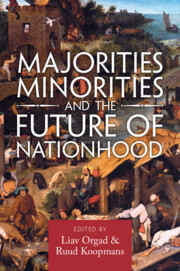Book contents
- Majorities, Minorities, and the Future of Nationhood
- Majorities, Minorities, and the Future of Nationhood
- Copyright page
- Contents
- Figures
- Tables
- Contributors
- Preface
- Acknowledgments
- A Note on the Cover
- 1 Majority–Minority Constellations
- 2 Are There Any Cultural Majority Rights?
- 3 Identity Not Culture
- 4 Nationhood, Multiculturalism, and the Ethics of Membership
- 5 Reconciling the Cultural Claims of Majorities and Minorities
- 6 Linking Minority Rights and Majority Attitudes
- 7 The Liberalism of Fear
- 8 Multiculturalism without Privileging Liberalism
- 9 Why Every Nation Should Nurture (a Thick and Inclusive) Nationalism
- 10 Populism and Cultural Majority Rights
- 11 Legitimate Populism and Liberal Overreach
- 12 The Causes of Populism and the Problem of Cultural Majority Rights
- Index
- References
8 - Multiculturalism without Privileging Liberalism
Published online by Cambridge University Press: 12 November 2022
- Majorities, Minorities, and the Future of Nationhood
- Majorities, Minorities, and the Future of Nationhood
- Copyright page
- Contents
- Figures
- Tables
- Contributors
- Preface
- Acknowledgments
- A Note on the Cover
- 1 Majority–Minority Constellations
- 2 Are There Any Cultural Majority Rights?
- 3 Identity Not Culture
- 4 Nationhood, Multiculturalism, and the Ethics of Membership
- 5 Reconciling the Cultural Claims of Majorities and Minorities
- 6 Linking Minority Rights and Majority Attitudes
- 7 The Liberalism of Fear
- 8 Multiculturalism without Privileging Liberalism
- 9 Why Every Nation Should Nurture (a Thick and Inclusive) Nationalism
- 10 Populism and Cultural Majority Rights
- 11 Legitimate Populism and Liberal Overreach
- 12 The Causes of Populism and the Problem of Cultural Majority Rights
- Index
- References
Summary
Liberalism’s primary medium is that of values, principles, and laws. One of the ways to de-absolutize liberalism in relation to multiculturalism and the respectful inclusion of minorities is to recognize the sociological and normative significance of other features of social life. I do so by focusing on the significance of identity and by highlighting the normative role of dialogue in a context of cultural and value conflicts. This offers a bottom-up basis for a political theory of multiculturalism, which is not simply about trends in academic liberalism but is about claims on national citizenship and national identity by those seeking inclusion in a new sense of the national. While a focus on identity, both in terms of recognition and in terms of fostering commonality and societal unity is not sufficient, it is a necessary dimension that political theorists who frame things in terms of liberalism miss, and thereby miss both what needs to be addressed and what is needed for liberal – amongst other – values to be secured. (Nor do socialists, human rights champions, cosmopolitans, or localists.)
- Type
- Chapter
- Information
- Majorities, Minorities, and the Future of Nationhood , pp. 201 - 224Publisher: Cambridge University PressPrint publication year: 2022
References
- 1
- Cited by



